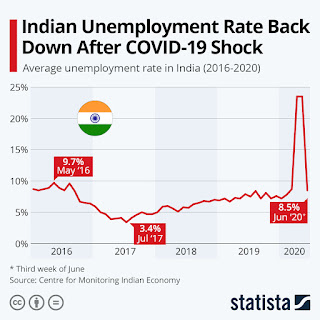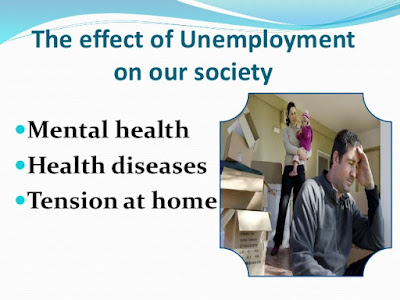Effects of Unemployment on Individuals, Society and the Economy
Effects of Unemployment on Individuals, Society and the Economy
What is Unemployment?
Unemployment is a term referring to individuals who are employable and actively seeking a job but are unable to find a job. Included in this group are those people in the workforce who are working but do not have an appropriate job. Usually measured by the unemployment rate, which is dividing the number of unemployed people by the total number of people in the workforce, unemployment serves as one of the indicators of a country’s economic status.
- Unemployment refers to the share of the labor force that is without work but available for and seeking employment. India unemployment rate for 2019 was 5.36%, a 0.03% increase from 2018. India unemployment rate for 2018 was 5.33%, a 0.09% decline from 2017.
Effects of unemployment on an individual
Unemployed individuals are susceptible to experiencing several challenges. These challenges are exacerbated the longer a person is unemployed. Common disadvantages of unemployment for individuals include:
Reduced income
Unemployed individuals experience reduced income as a direct result of not having a job. Because a job provides wages for the person, being unemployed takes away these wages and leaves the individual with less available income.
People who are unemployed and do not have any other source of income often rely on their savings or borrowed money to fund essential costs such as food and living expenses. Unemployed individuals who are the primary worker in the family face even more difficulty, as they must come up with the money to account for not only their own needs but for the needs of their family members.
Health problems
Unemployment can also have a significant impact on a person's physical health. Being unemployed is a highly stressful situation, so it may cause stress-related health issues such as headaches, high blood pressure, diabetes, heart disease, back pain and insomnia. These health issues often result in increased visits to a doctor and increased use of medication to manage the health conditions.
Many people rely on their jobs to provide health insurance, so when a person is unemployed they likely do not have access to health care. Unemployment can also increase a person's risk of further declined health, as they often skip health-related appointments to reduce costs.
Unemployed people are also less likely to spend money on health-related expenditures such as a gym membership or healthy food. By skipping out on these preventative measures, individuals increase their risk of a decline in physical health.
Negative familial effects
Family members of an unemployed person are also at risk of the negative impact of unemployment. According to the society for the psychological study of social issues individuals who are unemployed have less family and marital satisfaction and increased family challenges compared to unemployed people.
The study also found that the stress of unemployment can negatively impact the well-being of spouses. Some studies have also shown that children of unemployed individuals make less on average than those of employed people.
Mental health challenges
Studies have shown that unemployment increases a person's risk for depressive symptoms. Another mental health challenge that unemployed individuals often face is anxiety. Unemployed people often have decreased mental health compared to those who are employed. Unemployed persons also often experience a higher number of poor mental health days than their employed counterparts.
Another study, found that unemployment is associated with all the above mental health symptoms as well as psychosomatic symptoms, reduced subjective well-being and lower self-esteem. They found unemployed individuals to be twice as likely as employed persons to experience psychological challenges.
Effects of unemployment on society
The impact of unemployment also reaches out to the community and society in which the unemployed person lives. While one unemployed person will typically not have a significant impact on society, high unemployment rates in certain areas often lead to higher poverty rates and poorer neighborhoods that amplify the societal impact of unemployment.
Communities with high unemployment rates are more likely to have limited employment opportunities, low-quality housing, fewer available recreational activities, limited access to public transportation and public services and underfunded schools.
Effects of unemployment on the economy
In addition to effects on the individual and societal levels, unemployment also directly impacts the economy as a whole. According to the U.S. Bureau of Labor Statistics, when people are unemployed, they spend less money, which ultimately contributes to less contribution to the economy in relation to services or goods sold and produced.
Unemployed persons also experience a reduced purchasing power which can leave other individuals who create products that were purchased by these individuals without jobs as well.
Additionally, more than 70% of what the United States economy produces is purchased by consumers. Unemployed individuals consume much less than those who are employed, so a higher unemployment rate can leave the economy lacking in terms of products sold. This can leave organizations with decreased revenue.






Comments
Post a Comment